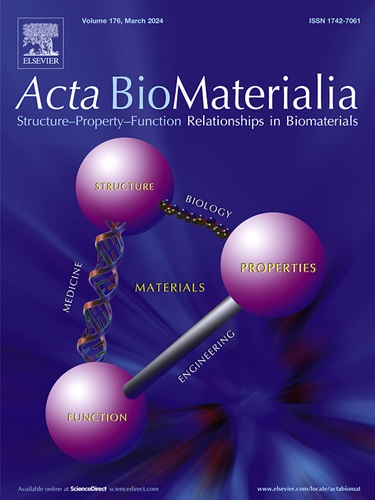Matrix metalloproteinases accelerate pericellular matrix breakdown and disrupt mechanotransduction in osteoarthritis
IF 9.4
1区 医学
Q1 ENGINEERING, BIOMEDICAL
引用次数: 0
Abstract
The pericellular matrix (PCM) is a specialized, narrow matrix surrounding each chondrocyte in articular cartilage, together constituting the chondron - the fundamental metabolic and functional unit of cartilage. The PCM plays a vital role in mediating biomechanical and biochemical signals essential for chondrocyte function. In osteoarthritis (OA), a chronic joint disorder characterized by progressive cartilage degradation, the PCM is one of the earliest sites of catabolic degradation, primarily driven by matrix metalloproteinases (MMPs). This study aims to investigate the functional relationship between PCM degradation and chondrocyte mechanosignaling, with an emphasis on MMP-driven changes in mechanotransduction in osteoarthritic cartilage.
Human chondrons (N = 64) were incubated with MMP-2, MMP-3, and MMP-7, and structural changes were assessed histologically by evaluating perlecan and collagen type VI. Cellular elasticity was measured using atomic force microscopy (AFM), and mechanically evoked intracellular Ca2+ transients were assessed via AFM single-cell indentations (500 nN).
All three MMPs induced pronounced catabolic effects on the PCM structure, showing distinct impacts on collagen type VI and perlecan, as well as on the biomechanical properties (p < 0.001). MMP-driven alterations in PCM integrity significantly reduced the Ca2+ transients of chondrons in response to mechanical stimuli (p < 0.001). While TRPV4 activation was elevated in intact chondrons, PIEZO channels were involved in mechanotransduction in both healthy and MMP-treated chondrons. In osteoarthritic stages, the mechanotransduction dynamics shifted significantly towards PIEZO channels.
This study elucidates the interplay between MMP-mediated PCM degradation, structural-functional dynamics, and chondrocyte mechanotransduction, underscoring the critical role of the PCM in maintaining normal chondrocyte functionality and mechanosensing.
Statement of significance
Osteoarthritis (OA) is a prevalent degenerative joint disease affecting millions worldwide. Central to its pathology is the degradation of the pericellular matrix (PCM) by matrix metalloproteinases (MMPs), which disrupts chondrocyte mechanotransduction, altering cellular responses to mechanical stimuli. This study explores the impact of MMP-2, MMP-3, and MMP-7 on PCM structure and chondrocyte mechanosensing. Our results reveal that MMP-induced degradation significantly compromises PCM structural integrity, leading to altered mechanotransduction dynamics in chondrocytes. Degradation specifically redirects the primary function of ion channels from TRPV4 to PIEZO channels in cells impacted by MMPs. This highlights the interplay between MMP-mediated PCM degradation, chondrocyte mechanotransduction and as thus structural-functional dynamics, underscoring the critical role of the PCM in maintaining normal chondrocyte functionality and mechanosensing.

求助全文
约1分钟内获得全文
求助全文
来源期刊

Acta Biomaterialia
工程技术-材料科学:生物材料
CiteScore
16.80
自引率
3.10%
发文量
776
审稿时长
30 days
期刊介绍:
Acta Biomaterialia is a monthly peer-reviewed scientific journal published by Elsevier. The journal was established in January 2005. The editor-in-chief is W.R. Wagner (University of Pittsburgh). The journal covers research in biomaterials science, including the interrelationship of biomaterial structure and function from macroscale to nanoscale. Topical coverage includes biomedical and biocompatible materials.
 求助内容:
求助内容: 应助结果提醒方式:
应助结果提醒方式:


